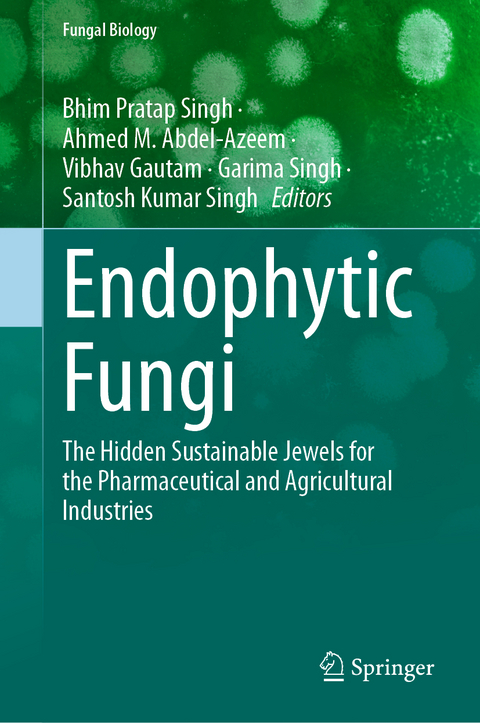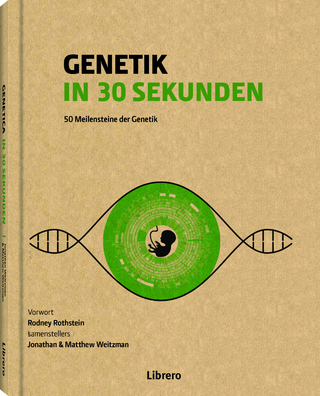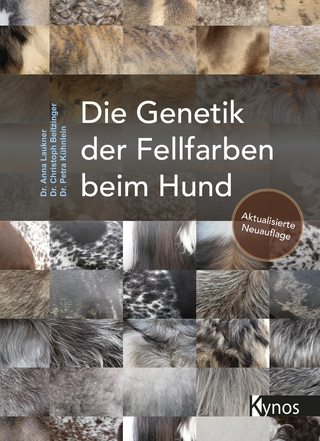
Endophytic Fungi
Springer International Publishing (Verlag)
978-3-031-49111-5 (ISBN)
Excessive use of pesticides in agriculture as well as in the food supply chain have led to increased antimicrobial resistance (AMR), which is one of the more serious global health concerns. Endophytic fungi and their associated bioactive substances have been reported to show natural ability to fight against pathogens and can reduce the development of AMR in nature. Studies also reported their potential as producers of hormones that enhance plant growth and several compounds having biological activities without any adverse effects.
This book covers the pharmaceutical potential offungal endophytes as elucidated through advanced bioinformatics tools and modern techniques. Also synthetic drugs are losing their efficacy to treat microbial-induced disease due to this emergence of drug-resistant microbes. Therefore, insight into the detection of valuable plant constituents is a pressing priority in order to achieve effective pharmaceutical treatments. This book provides lucid discussion of the most recent research and provides knowledge about the applications of endophytic fungi with a specific focus to their pharmaceutical potential.
lt;b>Prof. Bhim Pratap SinghAffiliations and expertiseProfessor, Department of Agriculture & Environmental Sciences (AES), National Institute of Food Technology Entrepreneurship & Management (NIFTEM), An Institute of National Importance (INI), Haryana, India
Dr. Singh is a Professor in the Department of Agriculture and Environmental Sciences at National Institute of Food Technology Entrepreneurship & Management (NIFTEM), An Institute of National Importance (INI), under the Ministry of Food Processing Industries, Government of India. Dr. Singh has obtained his Ph.D. from the Department of Biotechnology, Bundelkhand University, Jhansi, India while working in the Indian Agricultural Research Institute-National Bureau of Agriculturally Important Microorganisms (ICAR-NBAIM), Mau, India completed his post graduate training at the National Bureau of Plant Genetic Resources (ICAR-NBPGR), Pusa campus, New Delhi on Genetic Diversity of Barley Landraces by using RAPD markers. Dr. Singh has authored more than 100 research papers and book chapters in journals and books of international repute. Dr. Singh edited eight books published by Springer and Elsevier. He is a member of the Association of Microbiologist of India (AMI), the Asian PGPR society for Sustainable Agriculture, the Mushroom Society of India (MSI), and the Indian Science Congress (ISC). He received several prestigious awards from agencies such as DST, New Delhi and other agencies in the field of Microbial Diversity. Dr Singh has served as guest editors in many journals like Frontiers in Microbiology, Biology-MDPI, Journal of Fungi-MDPI, Frontiers in Molecular biosciences etc. His major research areas are in postharvest disease management using natural agents and improving the shelf life of fresh commodities to reduce food loss happening during the food supply chain.
Prof. Ahmed H. Abdel-AzeemProfessor, Suez Canal University in Egypt
Dr. Ahmed is a professor of mycology at Botany and Microbiology Department, Faculty of Science, Suez Canal University in Egypt and affiliated professor at Department of Genetics, Faculty of Natural and Agricultural Sciences, University of the Free State, Republic of South Africa. He is the founder and president of Arab Society for Fungal Conservation and executive Committee member of IMA (2018-2022). He is a Founder member of International Society for Fungal Conservation, Member in European Mycological Association, Member in Mycological Society of America. Abdel-Azeem is the president of African Mycological Association (AfriMA) and he founded Egypt's National Fungus day , African Annual Fungus Day and many mycologists' networks like Egyptian, Iraqi , Algerian and Pakistani networks. He is the founder of Pan Arab Mycologists. Abdel-Azeem with particular interest in the ecology, taxonomy, biology, and conservation of fungi and his specialist interest is members of the phylum Ascomycota. He is a member of the IUCN Species Survival Commission Specialist Group for Cup Fungi, Truffles & their Allies. Also, he is a member of Fungal Conservation Committee (FunCC) of IUCN.
Dr. Vibhav GautamAffiliations and expertiseCentre of Experimental Medicine and SurgeryInstitute of Medical SciencesBanaras Hindu UniversityVaranasi-India 221005 Vibhav Gautam attained his post-graduate degree from Savitribai Phule Pune University located in Pune, India. His academic journey continued with the successful completion of a Ph.D. in Biotechnology from the esteemed National Institute of Plant Genome Research in India. This Ph.D. was awarded by Jawaharlal Nehru University situated in New Delhi, India. Currently serving as an Assistant Professor at the Centre of Experimental Medicine and Surgery within the Institute of Medical Sciences a
1. Endophytic Fungi: Symbiotic Bioresource for Production of Plant Secondary Metabolites.- 2. Fungal endophytes as potential anticancer candidate over synthetic drugs: latest development and future prospects.- 3. Fungal endophytes as an alternative natural resource for the discovery of bioactive compounds of pharmacological importance.- 4. Pharmaceutically important fungal endophytes associated with mushrooms: current findings and prospects.- 5. Biological synthesis of nanoparticles from fungal endophytes and their application in pharmaceutical industries.- 6. Fungal endophytes and their role in postharvest disease management.- 7. Fungal endophytes and their bioactive compounds: An overview of potential applications.- 8. Potential Anti-Malarial Compounds from Fungal Endophytes.- 9. Bioinformatics approach in studying the fungal endophyte derived bioactive compounds with pharmacological relevance.- 10. Omics based approaches in studyingfungal endophytes and their associated secondary metabolites.- 11. Potential Antioxidant Compounds from Fungal Endophytes.- 12. Genetic, epigenetic and physicochemical strategies to improve pharmacological potential of fungal endophytes.- 13. Fungal Endophytes as biocontrol agents of plant pathogens.- 14. Fungal Endophytes as a sustainable source of Biomolecules: An overview with a focus to health aspects.- 15. Endophytic Fungi for Microbial Phytoremediation: Prospects for Agricultural and Environmental Sustainability.
| Erscheinungsdatum | 28.01.2024 |
|---|---|
| Reihe/Serie | Fungal Biology |
| Zusatzinfo | XXV, 348 p. 71 illus., 28 illus. in color. |
| Verlagsort | Cham |
| Sprache | englisch |
| Maße | 155 x 235 mm |
| Gewicht | 721 g |
| Themenwelt | Naturwissenschaften ► Biologie ► Genetik / Molekularbiologie |
| Naturwissenschaften ► Biologie ► Mikrobiologie / Immunologie | |
| Schlagworte | Bioactive Compounds • Endophytic Fungi • Fungal pathogens • pharmaceuticals • Plant Management Strategies • sustainable agriculture |
| ISBN-10 | 3-031-49111-4 / 3031491114 |
| ISBN-13 | 978-3-031-49111-5 / 9783031491115 |
| Zustand | Neuware |
| Informationen gemäß Produktsicherheitsverordnung (GPSR) | |
| Haben Sie eine Frage zum Produkt? |
aus dem Bereich


